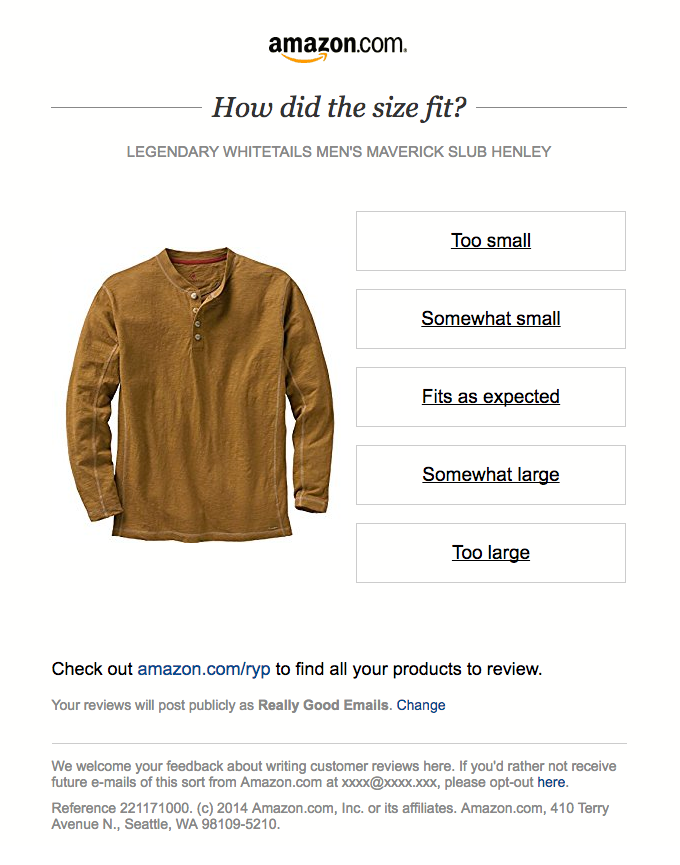Email Best Practices
How marketing emails can improve any industry
Emails are an essential marketing tool for businesses of all sizes and in all industries. In this post, we’ll show you how emails can help your business reach its full potential.

PUBLISHED ON
Anything a company does to promote its products or services can be considered marketing. It might include advertising, selling, or – you guessed it – email.
Although social media might be in the spotlight these days, the fact is email marketing still delivers some of the highest return on investment (ROI) of almost any marketing medium, no matter what industry you operate in. In fact, studies suggest that for every dollar you spend on your email marketing strategy, you can see close to $40 in returns. That’s nothing to sneeze at.
In this article, we'll break down how email marketing can improve engagement for companies in any industry, and we'll run through a few key terms to help prepare you to improve your email campaigns.
Table of content
Conversions
Brand awareness
Customer loyalty
Retail
Travel and hospitality
Financial institutions
Automotive
Small businesses
What are marketing emails?
So what exactly are marketing emails? Well, basically, a marketing email is an email that includes a commercial message or piece of content as its primary purpose. These emails are usually sent to whole contact lists or groups of prospects or customers and must follow local laws.
These can include promotional emails to make your customers aware of new products or discounts, re-engagement emails to keep them engaged between purchases, or informational emails like newsletters and announcements. In short, anything to build a sense of community around your brand.
In all cases, your email marketing content serves to promote your business, drive sales, increase brand awareness, and incentivize customer loyalty.
One of the major benefits of email marketing is its scalability. This means that emails can be sent to many recipients while remaining cost-effective (compared to other marketing channels).
It's important to remember you must first receive expressed consent from all contacts on your mailing list (or "opt in") before sending any emails. Otherwise, your marketing content may be flagged as spam.
How marketing emails can improve a company
The principal advantage of email marketing – as opposed to other forms of digital marketing – is that it allows you to personalize the messages you send. Addressing your customers individually will always have more impact than more generalized promotional content. Many businesses segment their email marketing content according to different target demographics or run A/B tests of varying subject lines and calls to action (CTAs) to pinpoint the best content and ensure maximum engagement.
Besides these basic advantages, email marketing can also help you improve your business in three specific areas:
Conversions
Brand awareness
Customer loyalty
Conversions
One of the main uses of email marketing is to generate leads and drive sales. Coupons, special offers, welcome emails, re-engagement emails, and abandoned cart emails all contribute to better conversion rates.
Brand awareness
Another common use for email marketing is to help build and maintain brand awareness with your audience. By driving traffic to your website, blog, or social media, you can ensure your company stays at the front of your customers’ minds.
Customer loyalty
Email marketing is central to any successful customer relationship management (CRM) system. Whether you're looking to assist in lead-nurturing, conversion, onboarding, or retention, marketing emails help make sure your customers keep coming back for more.
Benefits of using marketing emails in different industries
Not all industries benefit equally from email marketing. That’s because different target audiences respond to marketing emails in different ways.
Below you’ll find a brief rundown of how email marketing helps businesses in different industries.
Retail
Both ecommerce and traditional retailers are among those that benefit the most from email marketing. Unlike some other industries, retailers can easily link conversion rates to marketing activity, allowing them to directly track their returns on investment.
Retailers can also collect considerable amounts of data from their email subscribers for marketing use. For example, tracking previous purchases allows companies to send promotional emails to targeted customer groups. This is particularly true for large retailers like Amazon, Walmart, and Target, which have more data that allows them to send hyper-targeted, relevant email updates.

Travel and hospitality
Hotels and airlines can use email marketing to their advantage as well. When registered users search for flights or accommodations without completing a booking, companies can send follow-up emails with other recommendations, along with prices and reviews.
For example, Airbnb uses personalized automated emails to quickly contact potential customers when certain behaviors are detected, like when they’ve searched for a place to stay but didn’t follow through with the reservation.

Likewise, restaurants can offer specially timed offers to generate more sales or promote services like delivery and curbside pickup to attract new customers.
Financial institutions
Financial institutions benefit from their ability to draw on extensive customer account data to send timely, targeted email marketing content that taps into their customers’ specific needs and wants.
For example, Bank of America can collect data about customer preferences and directly reference them to interest a specific customer in email subject lines, leading to better open and click-through rates.

Automotive
Email marketing is a powerful tool for the automotive industry. That’s because car dealers rely on a relatively small amount of customers to cover their profit margins, so even a low engagement rate can lead to a significant uptick in revenue.
Plus, direct messaging is more cost-effective than television ads, and it also tracks ROI more efficiently.
Small businesses
Email marketing is a great way for small businesses to boost their numbers and grow their market share. And since smaller companies often have considerable growth potential, email marketing campaigns provide an excellent ROI.
Email also helps small businesses learn about their audience, which is essential during the early growth phases. Email marketing provides valuable data about how your campaigns are landing and how many conversions different messages generate, allowing you to optimize your overall marketing platform.
Other email marketing stats
The global email marketing market was valued at $7.5 billion in 2020 and is projected to increase to $17.9 billion by 2027. (Statista, 2021)
There are 4 billion daily email users. This number is expected to climb to 4.6 billion by 2025. (Statista, 2021)
More than 306 billion emails are sent and received each day. (Statista, 2021)
31% of B2B marketers say email newsletters are the best way to nurture leads. (Content Marketing Institute, 2020)
Although people primarily check email on iPhone devices, Gmail is still the most-used email service, with more than 1.5 billion users (CNBC, 2019)
45% of internet users avoid opening emails from unknown addresses. (Statista, 2019)
91% of women in the US use email, compared to 89% of men. (Statista, 2019)
81% of B2B marketers say their most used form of content marketing is email newsletters. (Content Marketing Institute, 2020)
31% of B2B marketers say email newsletters are the best way to nurture leads. (Content Marketing Institute, 2020)
87% of B2B marketers say email is one of their top free organic distribution channels. (Content Marketing Institute, 2020)
90% of content marketers say email engagement is the top metric they track to measure content performance. (Content Marketing Institute, 2020)
Takeaways
Email marketing is hands-down one of the best strategies to grow your business. That's because emails provide an affordable way to send targeted, timely, and engaging content to a vast number of people at once, while also allowing you to track your campaign's impact in real-time.
So what are you waiting for? Check out Mailjet today and get the best partner around to help with your next email marketing campaign. While you focus on creating attractive, successful campaigns that engage your email list, we'll take care of getting your emails to their inbox with our proven suite of deliverability tools.
What's your email strategy? How has your business benefited from email marketing? Let us know on Twitter and Linkedin!








